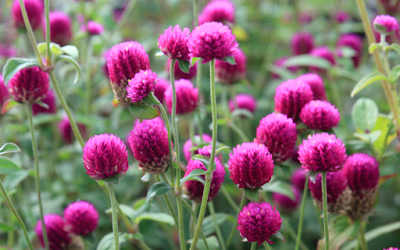 |
| Morphology, Production technology and Uses of Globe amaranth |
How to grow Globe amaranth
English name: Globe amaranth / Bottam flower
Scientific name: Amaranthus globosa
Family: Amaranthaceae
Origin: Central America / tropics
Description:
· Habit: Herbaceous, An annual herb, hardy in nature
· Leaf: Compound
· Color of flower: Different colors found. Eg. Reddish, Pink
· Flower: Opposite compound
· Habit: Herbaceous, An annual herb, hardy in nature
· Leaf: Compound
· Color of flower: Different colors found. Eg. Reddish, Pink
· Flower: Opposite compound
Production technology:
· Climate: Tropical and subtropical. But in subtropical region it grows well.
· Soil: Well drained loamy to sandy loamy soil
· Growing season: Both Winter and Rainy season
· Panting time: February – March for summer crop and October – November for winter crop, Seedlings are thinned to 30 – 45 cm
· Age of transplanting: At the age of 20 – 25 days
· Spacing:
Plant to plant – 25 cm, Line to line 30 cm (for summer flower)
Plant to plant – 20 cm, Line to line 25 cm (for winter flower)
· Propagation: By seed or seedlings.
Plant to plant – 25 cm, Line to line 30 cm (for summer flower)
Plant to plant – 20 cm, Line to line 25 cm (for winter flower)
· Propagation: By seed or seedlings.
Fertilizer dozes: Fertilizer dozes for Globe amaranth for per bed is
· Cow dung: 2 – 3 kg
· TSP: 50 gm.
· MP: 75 gm
· (NH)SO: 50 gm
· TSP: 50 gm.
· MP: 75 gm
· (NH)SO: 50 gm
Cow dung and TSP are applied at the time of land preparation.
Intercultural operation:
1. Irrigation
2. Weeding
Pest and disease management:
· Pest: Beetle
· Disease: leaf blight
Uses: Used as –
1. Dry flower
2. Cut flower
3. Pot flower
2. Cut flower
3. Pot flower
Useful Agricultural Websites